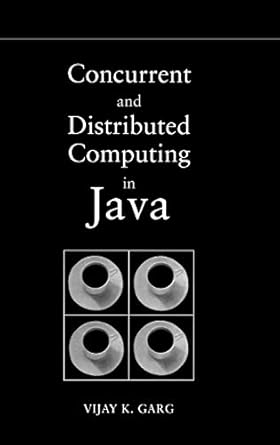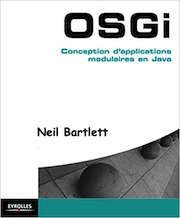
|
FreeComputerBooks.com
Links to Free Computer, Mathematics, Technical Books all over the World
|
|
- Title: Concurrent and Distributed Computing in Java
- Author(s) Vijay K. Garg
- Publisher: Wiley-IEEE Press; 1st edition; eBook (Online Edition)
- Paperback: 336 pages
- eBook: PDF
- Language: English
- ISBN-10: 047143230X
- ISBN-13: 978-0471432302
- Share This:

|
This book addresses fundamental concepts in concurrent computing with Java examples, deals with techniques for programming in shared-memory based systems, as well as programming in a message-passing system.
About the Authors- N/A
- Advanced Java Programming
- Parallel, Concurrent, and Distributed Computing and Programming
- Embedded and Reatime Systems and Programming
 Similar Books:
Similar Books:
-
 Java Based Real Time Programming (Klas Nilsson)
Java Based Real Time Programming (Klas Nilsson)
This book approaches the real-time issues via established web-programming and concurrency techniques, which will reveal a few deficiencies of the standard Java platform. A real-time package and a few run-time extensions will be presented.
-
 Dynamic Proxies in Java (Heinz M. Kabutz)
Dynamic Proxies in Java (Heinz M. Kabutz)
Dynamic proxies are such a tool that we can use it to save thousands of lines of repetitive code with a single class. This book is for intermediate to advanced Java programmers who want to get to "guru" status. It is not suitable for beginners in Java.
-
 OSGi In Practice (Neil Bartlett)
OSGi In Practice (Neil Bartlett)
This book is a comprehensive guide to OSGi with two primary goals: first introducing to OSGi concepts with examples, then exploresing numerous practical scenarios and techniques, as well as answering questions.
-
 Building Reactive Microservices in Java (Clement Escoffier)
Building Reactive Microservices in Java (Clement Escoffier)
This book is for developers and architects interested in developing microservices and distributed applications. It does not explain the basics of distributed systems, but instead focuses on the reactive benefits to build efficient microservice systems.
-
 Is Parallel Programming Hard? If So, What Can You Do About It?
Is Parallel Programming Hard? If So, What Can You Do About It?
It examines what makes parallel programming hard, and describes design techniques that can help you avoid many parallel-programming pitfalls. It is primarily intended for low-level C/C++ code, but offers valuable lessons for other environments as well.
-
 Introduction to Parallel Computing (Blaise Barney)
Introduction to Parallel Computing (Blaise Barney)
This book explains how to design, debug, and evaluate the performance of distributed and shared-memory programs. It teaches students how to compile, run and modify example programs. It is a complete end-to-end source of information on almost all aspects.
-
 Notes on Theory of Distributed Systems (James Aspnes)
Notes on Theory of Distributed Systems (James Aspnes)
This book rovides a comprehensive source of material on the principles and practice of distributed computer systems and the exciting new developments based on them, using a wealth of modern case studies to illustrate their design and development.
-
 Distributed Systems, 3rd Edition (Maarten van Steen, et al)
Distributed Systems, 3rd Edition (Maarten van Steen, et al)
This book covers the principles, advanced concepts, and technologies of distributed systems in detail, including: communication, replication, fault tolerance, and security. It shows how distributed systems are designed and implemented in real systems.
-
 Introduction to High-Performance Scientific Computing (Eijkhout)
Introduction to High-Performance Scientific Computing (Eijkhout)
This is a textbook that teaches the bridging topics between numerical analysis, parallel computing, code performance, large scale applications. it assumes a basic knowledge of numerical computation and proficiency in Fortran or C programming.
-
 Programming on Parallel Machines: GPU, Multicore, Clusters, etc.
Programming on Parallel Machines: GPU, Multicore, Clusters, etc.
The main goal of the book is to present parallel programming techniques that can be used in many situations for many application areas and which enable the reader to develop correct and efficient parallel programs.
-
 Parallel Computing Works! (Geoffrey C. Fox, et al.)
Parallel Computing Works! (Geoffrey C. Fox, et al.)
A clear illustration of how parallel computers can be successfully applied to large-scale scientific computations. This book demonstrates how a variety of applications were implemented on real parallel computers to produce new scientific results.





